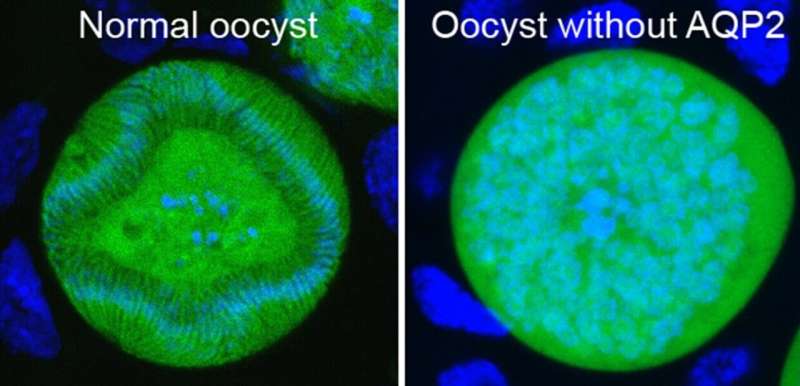This article has been reviewed according to Science X's editorial process and policies. Editors have highlighted the following attributes while ensuring the content's credibility:
fact-checked
peer-reviewed publication
trusted source
proofread
Malaria parasite gene could be effective drug target to block transmission

A newly-discovered gene in the malaria parasite could be a good target for future drugs aimed at preventing disease transmission.
The gene, discovered by Imperial College London researchers, is crucial for the development of the infectious stage of the malaria parasite. It also has unique features that could make it a good target for future drugs.
Half of the world's population is at risk of contracting malaria, and in 2021 alone there were over 247 million cases and 619,000 deaths from malaria, mostly children under five years old in sub-Saharan Africa.
With current measures failing to halt disease transmission, new ways to control the spread of malaria are desperately needed. One research avenue is looking for ways to stop the parasite in its tracks.
Critical transformation
Malaria is a disease that spreads through mosquito bites. When a mosquito bites a person infected with malaria, it becomes a carrier of the malaria parasite. Inside the mosquito, the parasite undergoes various stages of development before it becomes capable of infecting another person when the mosquito bites again.
One critical transformation in this process occurs inside the mosquito gut, where a stage called the oocyst fills with sporozoites, which are the forms of the parasite that can infect humans. Eventually, these burst out of the oocyst and make their way to the mosquito's salivary glands, ready to infect at the next bite.
The team found a specific gene in the parasite, known as aquaporin 2 (AQP2), which plays a crucial role in this transformation. When they removed the AQP2 gene from the parasites, the oocyst stage was unable to produce sporozoites, preventing the parasite from completing this pivotal stage in its lifecycle.
In experiments conducted with the mouse version of malaria, the team confirmed that the parasites without the AQP2 gene could not be transmitted among mice through mosquito bites.
The results of the study, titled "Intracellular Plasmodium aquaporin 2 is important for sporozoite production in the mosquito vector and malaria transmission," by researchers in the Department of Life Sciences at Imperial, are published in Proceedings of the National Academy of Sciences.
Promising drug target
Ph.D. candidate and co-first author of the study Alexander Bailey explained, "The malaria parasite has a complex lifecycle, which involves both humans and mosquitoes, which makes it difficult to eliminate. However, there are numerous ways to potentially block its progression from one life stage to another, and this new target presents a very promising avenue to disrupt the transmission cycle."
The other co-first author, Dr. Chiamaka Valerie Ukegbu, added, "In our mouse experiments, we show that AQP2 is required for malaria to be transmitted. Without it, a mosquito bite carrying malaria doesn't have the necessary sporozoites to advance the parasite to its next life stage, which, in humans, would prevent illness."
The newly-described gene codes for a protein channel that allows the movement of water and other dissolved substances across cell membranes, including movement between organelles and their surrounding cytoplasm.
While its exact function in sporozoite development isn't clear, the importance of AQP2 to the parasite lifecycle gives the team hope that this gene can be targeted in future efforts to combat malaria.
Aquaporins have been the subject of intensive drug research in other contexts, such as cancer and metabolic diseases. Therefore, the team believe that the newly discovered AQP2 holds the potential to be a promising drug target, particularly as it seems to be unique to malaria parasites and has distinct and unusual characteristics. As a result, any drugs targeting AQP2 are unlikely to affect other aquaporins in humans or mosquitoes.
Dr. Dina Vlachou, the senior scientist at Imperial who led the study, said, "Aquaporins are gaining interest for their roles in a number of diseases, and findings demonstrate another avenue through which drugs designed to target them could be a crucial tool in the battle against malaria."
More information: Alexander J. Bailey et al, Intracellular Plasmodium aquaporin 2 is important for sporozoite production in the mosquito vector and malaria transmission, Proceedings of the National Academy of Sciences (2023). DOI: 10.1073/pnas.2304339120
Journal information: Proceedings of the National Academy of Sciences
Provided by Imperial College London




















